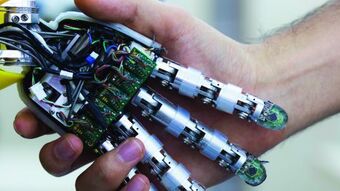How to keep the faith in the digital revolution - The Law of the Few

This is the second in a series of blog posts by Matt James, looking at how we can keep the faith in the digital revolution. The first of the series can be read here.
In our previous blog we were looking at the impact of the digital revolution and beginning to consider what factors could help shape a Christian response. What lessons can we learn for Christian engagement as the digital revolution develops? How can we achieve a tipping point that goes beyond just a deluge of new tech to one which ushers in a revolution that helps humanity to flourish through the appropriate use and application of digital technology?
In his book, The Tipping Point, Malcom Gladwell identifies three key factors which help to achieve the Tipping Point, which I think can help influence our thinking on this important subject:
1. The law of the few
2. The stickiness factor
3. The power of context
The ‘law of the few’ refers to “the success of any kind of social epidemic is heavily dependent on the involvement of people with a particular and rare set of social gifts" [1]. This kind of thinking is reflecting in what economists refer to as the 80/20 principle: in any given situation roughly 80 percent of the 'work' will be done by 20 percent of the participants.
So what relevance does this have to digital revolution? In this wonderful new world of connectedness, the Internet provides us with amazing access to vast amounts of knowledge. Undoubtedly this does help us to access information in order to keep informed on issues and to allow us to think for ourselves as to what our response might be. At the same time, this quick and easy access to information also means we have unparalleled exposure to a vast array of opinion and perspectives on practically every topic under the sun. From public affairs to parenting; from clothes to pet choice, there is always someone out there who is more than willing to share their views. This means it is a lot easier for people to believe things that are downright bizarre that they would otherwise recognize as not being likely to be true.
Many of us mostly settle down into an online life that best suits us . We recognize our particular take on life, hobbies, interests and currents affairs and we settle down into the online life that keeps us within our comfort zone. Our ‘filter bubble’ helps to filter out facts and opinions we don’t like.
This new digital revolution is empowering us to gain understanding and perspective on many different issues and yet at the same time, it facilitates those who have more extreme and odd views to make their voice heard and share their ideas. When we weren’t able to so easily connect with people in the same country, let alone in a different part of the world, it wasn’t so easy to gather support and build momentum for their ideas. The digital revolution is helping to respond to this by bringing people ‘together’ in a new way and to build support around ideas. To use Gladwell’s words: we can create a tipping point for their ideas.
But ideas spreading like wildfire says nothing about the authenticity and reliability of the ideas being shared.
We have to remember that experts can get it wrong. Just think back to the time before Copernicus and Galileo. The established scientific community held the view every bit as strongly as the religious community that Earth was the centre of the universe, around which the sun and other planets revolved. Copernicus and Galileo challenged this idea with their ground-breaking and radical proposal that Earth actually revolved around the sun.
This doesn’t mean we should disregard science in the belief that it will be likely proved wrong or even dismiss entirely the value that scientific knowledge and explanation can bring to understanding everyday life. It calls for us to appreciate the nature of how scientific knowledge can advance and develop. As argued by Thomas Kuhn, physicist-turned-philosopher and historian of science, we can be sure it is likely to look very different in future to how it looks now.
With this in mind it is important to remember that as with so many aspects of life, the internet’s greatest strength can be its greatest weakness. The ease at which new ideas and information can be shared and broadcast around the world means that it is an equally efficient generator and disseminator of ideas and perspectives, which have little grounding in fact or truth. Cue the emergence of ‘fake news’.
The challenge is to be found in deciding how best to think for ourselves and yet not fall prey to the latest charlatan ‘tale’. A basic, yet practical approach is to disagree with what almost everyone thinks so you can find a group of people who are ‘experts’ who equally agree with you. It needs to be more than you and your dog but equally it doesn’t have to be many. But a few. As Nigel Cameron comments:
“I know very little about cancer or vaccine, but I do know that unless a bunch of people who know an awful lot about these things are prepared to put their reputations on the line, it’s ridiculous for me to disagree with the wisdom of the scientific community. Of course, if I am an ‘expert’, it’s a different question. But unless I am, I’m either a charlatan myself or following the charlatan who has dared to challenge everybody else.” [2]
In this era of the digital revolution, we can see how the law of the few can be applied to explain the ease by which people can share their ideas and gather support for them. There is equally a lesson here for Christians to develop an enquiring mind. Not a mind that is deeply suspicious of anything new but is open to learn and question.
It is timely to remember the apostle Paul’s words in Romans 12:2 – “Do not conform to the pattern of this world, but be transformed by the renewing of your mind. Then you will be able to test and approve what God’s will is—his good, pleasing and perfect will”. Note Paul said by the renewing of your mind, not its removal. Our mind, understanding and reasoning is important to God and we need to use it, listening to and paying close attention to the Word of God, humbly submitting to its guidance and instruction as we grow as believers. At the same time, yet in a different way, we are to as John Stott urged us, to ‘double listen’ – “listen to the world with critical alertness, anxious to understand it too, and resolved not necessarily to believe and obey it, but to sympathise with it and to seek grace to discover how the gospel relates to it” [3].
Jesus made almost an art form out of asking questions in order to help his listeners uncover meaning and understanding. Questions have been described as “… merely launching pads for further exploration, places to prepare for the creation of new and more insightful questions” [4]. Could it be that as we double listen and engage in the art of asking questions of the digital revolution, we might find some new perspectives and ideas to help answer the tough questions of today and tomorrow?
If the law of the few speaks of how just a handful of people can add advance news ideas, then surely this same ‘law’ also provokes Christians to not cower in the corner, but play their part in helping to question and critique ideas being advanced so as to see the digital revolution as a force for good in humanity’s flourishing.
Photo credit: Javardh on Unsplash
———————
[1] Gladwell, M. (2000). The Tipping Point: How little things can make a big difference. London: Abacus.
[2] Cameron, N. (2018) God & My Mobile. Keeping the faith in a digital world. London: CARE Trust. p113
[3] Stott, J. (1992). The Contemporary Christian: An urgent plea for double listening. Nottingham: Intervarsity Press, pp. 27-28
[4] Christensen, C.R., D.A. Garvin, A. Sweet (ed). (1991) Education for Judgement: The artistry of discussion leadership. Boston: Harvard Business School Press. p93




Share story
How to keep the faith in the digital revolution - The Law of the Few